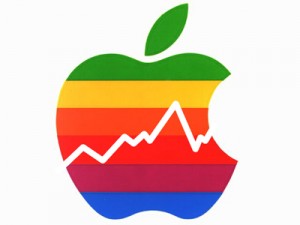The mass sell off of Apple’s stock is being driven by the looming fiscal cliff, specifically the expiration in January of tax cuts implemented by Bush.
Apple’s share price fell as low as $505.75 during Friday’s trading, although it eventually closed at $527.68 that day. This represents a loss of $200, or more than a quarter of its value (28.27%), since AAPL hit its all-time high of $705.07 during the day’s trading on 21 September. The decline has also shaved about $170 billion off the company’s market capitalisation, although, with a Market Cap of $493 billion it’s still the most valuable US company, with Exxon Mobile about $100 billion behind it.
The debate about what has caused Apple’s stock to plummet continues, but a report by Reuters sheds some light on the motivations of the shareholders who are selling up, and the new investors that are holding off buying the AAPL stock, which the vast majority of analysts are recommending as a buy.
Hanging over the fiscal cliff
So why are people selling rather than buying? According to the Reuters report, Apple’s investors are cashing in their gains now so that they won’t be hit by next year’s increased taxes, and new investors are holding off while they wait to hear the outcome of talks in Washington.
A “rush to secure profits before a potential hike in capital gains taxes next year has investors dumping the market favourite”, explains Reuters.
Currently there is a 15% tax rate on dividends and capital gains, but this is to expire at the end of the year. From 2013, as part of the USA’s deficit-cutting attempts, dividends and capital gains will be taxed as ordinary income, which means the highest earners would face rates of 35%.
BB&T Wealth Management’s Bucky Hellwig told Reuters: “Some of the selling is being driven by these tax decisions, but the flip side is there is not a lot of buyers because the buyers are procrastinating to see how the negotiations come out. You probably have an inordinate effect to the downside because of these tax strategies.”
In other words, investors who have ridden Apple’s stock surge over the past couple of years face a 15% tax bill if they sell now and a possible 35% one if they do in January, as Forbes summarises.
One of Apple’s execs has just sold 20,726 of his Apple shares in what may well be an attempt to avoid this tax hike. Apple’s new senior vice president of Hardware Engineering, Dan Riccio has disposed of nearly 20,000 shares of stock worth nearly $11 million dollars last week, according to SEC filings.
Riccio also made a donation of 1000 shares (roughly $527) to an unspecified charity, as reported by CNET.
Riccio highlights an interesting point about Apple’s shareholders. There are more than 900 million Apple shares, according to Motley Fool, but only 27,696 investors, according to Apple’s recent Form 10-K (we calculate that that’s an average of 32,496 shares per shareholder). That indicates that many Apple shareholders own a high volume of shares and therefore stand to lose a lot from the tax hike.
The fiscal cliff selloff isn’t the only new theory for the current downturn. Another report notes the “fiscal cliff selloff pressure that Apple has endured since October 31,” but adds that the stock is now geared up to “skyrocket” due to a “slingshot phenomenon”.
Jason Schwarz writes in Seeking Alpha that AAPL will skyrocket, “just as it has during the last 10 slingshots because every money manager on Wall Street trusts Apple’s fundamental growth story and they know that maxing out Apple allocations is key to outperforming their index. This slingshot phenomenon will continue to play itself out for as long as Apple occupies the pole position as market leader.”
The slingshot is often misunderstood as being caused by negative articles about Apple in the media, explains Philip Elmer-Dewitt in an article for Fortune. “Quite the opposite. It’s caused by mutual fund managers rebalancing a stock they’ve loved too much.”
So the message appears to be that Apple’s stock is set to rise again, but that investors are hanging on to find out whether they will be hit by a high capital gains tax rate in January.






